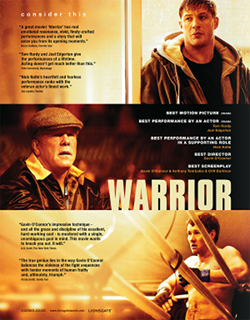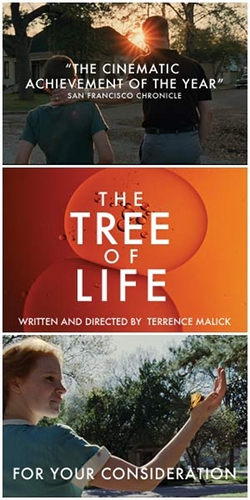Review: The Tree Of Life (2011)
Terrence Malick’s The Tree of Life was just released on Blu-Ray and DVD, and though its uniquely cinematic grandiosity seems suited for no less than huge 35mm projection, the film’s sometimes tangible, sometimes beautifully-intangible intimacy will speak to audiences no matter what the transmission medium, no matter how big or small the screen.
What’s most frustrating thing about writing on the film is that it is so nebulous and subjective. More than any film ever made, The Tree of Life simultaneously focuses its gaze on the cosmic and the earthbound, the grandly general and the acutely intimate. As a result, the film is infinitely more subjective than even most other films – and the cinematic medium is already the most subjective art form. No two opinions of Malick’s latest film are exactly alike, and there is no limit to the depth one could analyze its subtleties.
By now it is safe to say that no living filmmaker is as broadly ambitious as Malick, who is infuriatingly singular and relentlessly meticulous, a filmmaker whose works are living and breathing manifestations of his profound philosophies on the world as filtered through his own conflicted inward experience. He has made so few films because it would not be possible to have a prolific output of films of this magnitude. That is what makes Malick’s works so special and unique. The Tree of Life is, without question, his most ambitious work ever, and it is quite possibly the first multi-sensory filmic experience since Kubrick’s 2001: A Space Odyssey. That is not to say it’s in 3-D or Smell-O-Vision or that water squirts out of your seatback; it means that the weight of humanity and the enormity of nature surround the viewer in ways other films are simply unable to achieve or fathom. This is not a film that is “viewed,” “watched,” or any other limiting term that inherently separates the art from those who absorb it. The Tree of Life is cinema that must be felt, sensed, and engaged with in both emotional and intuitive ways.
One could say the film is non-narrative, but that’s actually not quite true. Malick tells a clear story here – not with a traditional structure, but it is a true narrative. It is the story of Jack, who we see both as an adolescent confronting the film’s stated dichotomy between “nature” and “grace,” as well as an adult in a state of perpetual existential pondering. Relative unknown Hunter McCracken plays the young Jack and Sean Penn is the adult Jack (in a role Malick significantly cut down during the editing process, which left Penn less-than-satisfied). The young Jack is the film’s true lead and its most tangible human conduit, but “Jack,” like every character, scene, and moment in the film, is a memory, a prayer, and a meditation on the role of humanity in a world that is at once insular and ever-expanding.
The pains, influences, and temptations of adolescence – specifically male adolescence – are fully felt through McCracken’s wide and impressionable eyes. With barely any dialogue, he conveys the internal struggle between the flowing grace embodied by his mother (Jessica Chastain, in the first of her extraordinary breakout performances in 2011) and the crushing “nature” espoused by his father (Brad Pitt, also having a career year). In a film that charts a progression from literally the beginning of time to possibly the end, the young Jack – and, in turn, McCracken’s performance – is the one clear emotional center, and it is through this abbreviated section of his life that Malick’s permits us to see that we understand what the auteur is reaching for. This is a film about both the expanding weight of an inward life and the striking smallness of each life in a universe of imperceptible vastness.
Malick expands outwardly from the narrative both backwards and forwards – first pulling back to conduct a visual symphony of nothing less than the creation of the universe and then flashing forward to what many have referred to as an afterlife of sorts, or a nebulous representation of an apocalypse of healing and reconciliation. Music and visual effects become central to the film’s power in these sequences. As he often does, Malick employs a gorgeous catalogue of classical selections, weaving them together with original material by Alexandre Desplat to build one of the year’s most evocative aural accompaniments. Visually, Malick works with effects legend Douglas Trumbull (another undeniable 2001 connection) to present the explosion of the cosmos and the origin of species, including that long-rumored dinosaur shot, the content of which makes absolute thematic sense for the film.
Many have interpreted the film’s finale, with its images of a pilgrimage on a barren beach, as Malick’s version of an afterlife. They aren’t wrong – if for no other reason than the very nature of the film precludes any one definitive answer about any single element. But I culled something different. The Tree of Life is a movie full of psychic representations of intangible thoughts and feelings, and as such, I am not inclined to perceive any sequence in a literal way. The sequence is surely spiritual and apocalyptic in a very artful way, full of subtle and overt symbols of not merely forgiveness and reconciliation, but also rebirth and renewal, the release of pain and the beginning of understanding. Could this be an afterlife? Yes, but it could also be a renaissance. Perhaps Jack was dead before and his life can now truly begin. The possibilities are boundless, but one ideal resolution does not exist – even Malick may not know its answer. After all, that is The Tree of Life’s ultimate message: we inhabit this extraordinary sphere, feeling every moment as if we are the center of the universe, nearly always forgetting how small we really are, never having all the answers but striving to find contentment within our restless, warring souls.
-
http://twitter.com/TapaidhNaomh Brian J. Roan
-
http://www.dearfilm.net Brian J. Roan
-
Anonymous
-
http://twitter.com/NextProjection Christopher Misch
-
http://nextprojection.com/2012/01/01/2011-next-projection-awards/ 2011 Next Projection Awards | Next Projection













 Review: Le Havre (2011)
Review: Le Havre (2011) Review: Harakiri (1962)
Review: Harakiri (1962) Review: Return of the Living Dead (1985)
Review: Return of the Living Dead (1985) Review: Killer Elite (2011)
Review: Killer Elite (2011) Subversive Saturday: Traite de bave et d’eternite (1951)
Subversive Saturday: Traite de bave et d’eternite (1951)



